Bringing a dog into your family is a wonderful decision, filled with the promise of fun, companionship, and unconditional love. Dogs enrich our lives in countless ways, offering laughter, loyalty, and cuddles. However, selecting the right dog breed is crucial to ensure a harmonious household where both humans and canines thrive for years to come.
This guide explores the essential traits that make certain dog breeds exceptionally well-suited for family life. We will delve into breeds known for their patience with children, gentle temperaments, and trainability, making them ideal companions for homes of all kinds.
What Makes a Dog Breed Ideal for Families?
Choosing a family dog goes beyond mere aesthetics. It requires careful consideration of your family’s lifestyle, activity level, living space, and level of commitment. Understanding your family’s dynamics is paramount to finding the perfect canine fit.
Before bringing a dog home, honestly assess if your family is ready for the responsibility. It’s essential to choose a breed that aligns with your capacity to provide proper care and attention.
When searching for a good dog breed for your family, prioritize these key factors:
Temperament
Temperament is the most crucial aspect. An ideal family dog possesses an easygoing and patient personality, capable of handling the typical exuberance of children. Breeds known for their calm and gentle nature, such as Retrievers and Poodles, are often excellent choices for families. These breeds are generally tolerant and can adapt well to a bustling family environment.
Size
Size matters, particularly when considering a family with young children. Small to medium-sized dogs are often recommended as the best family dogs. Their size is less imposing and they are generally easier for children to manage and interact with safely. Consider your living space as well; a smaller dog might be more comfortable in an apartment, while a larger dog might need a yard to roam.
Energy Level
A dog’s energy level is another critical factor. An energetic breed requires significant exercise and mental stimulation to remain happy and well-behaved. Before choosing a high-energy breed, honestly evaluate if you or your children can consistently provide the necessary physical activity. If your family prefers a more relaxed lifestyle, consider mellow companions like the Bichon Frise, who are content with moderate exercise.
Hypoallergenic Considerations
If allergies are a concern within your family, explore hypoallergenic dog breeds. While no dog is completely allergen-free, some breeds produce less dander and shed less, reducing the likelihood of allergic reactions. Excellent hypoallergenic dog breeds for families include Poodles, Bichon Frises, Kerry Blue Terriers, and Maltese. If possible, arrange for the family member with allergies to spend time with the prospective dog before bringing it home to assess potential reactions.
Top Dog Breeds for Families
When selecting the best dog for your family, prioritize breeds known for their patient temperaments and energy levels that harmonize with your family’s lifestyle. Child-friendly companions like Labrador Retrievers and Poodles are popular choices, renowned for their gentle nature and ability to contribute to a joyful home environment.
- Labrador Retriever
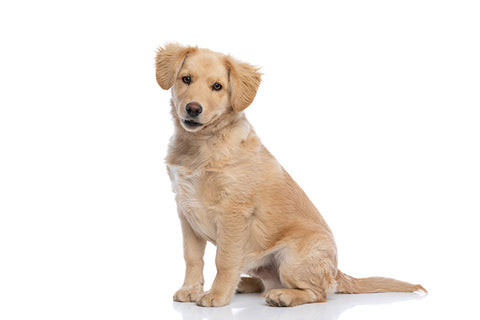 Labrador Retriever
Labrador Retriever
Labrador Retrievers effortlessly integrate into family life, embracing the bustle and activity with enthusiasm. Their characteristic “let’s play fetch” demeanor speaks volumes about their playful and eager-to-please nature. Labs are consistently ranked among the most popular family dogs due to their versatility and loving disposition.
Characteristics:
- Personality: Outgoing, patient, and relaxed, Labrador Retrievers are known for their friendly and adaptable nature.
- Energy: High energy levels mean they need regular exercise, making them great companions for active families.
- Good with Children: Absolutely! Labs are legendary for their patience with children, though supervision is always recommended to ensure safe interactions between dogs and kids.
- Good with Other Dogs: Yes, Labs generally get along well with other dogs, especially with proper socialization.
- Shedding: Moderate shedding occurs year-round, requiring regular cleaning.
- Grooming: Weekly brushing is usually sufficient, with increased brushing needed during shedding seasons.
- Bernese Mountain Dog
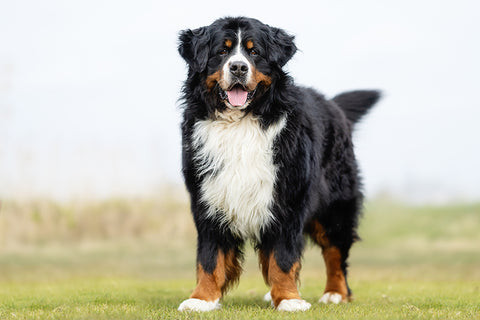 Bernese Mountain Dog
Bernese Mountain Dog
Bernese Mountain Dogs are gentle giants, characterized by their affectionate nature, loyal spirit, and intelligence. Despite their large size, they are wonderful family dogs, known for being calm and good-natured around children. They require moderate activity to stay healthy and happy.
Characteristics:
- Personality: Affectionate, gentle, and playful, Bernese Mountain Dogs thrive on family interaction and companionship.
- Energy Level: While large, they have moderate energy needs, requiring daily walks and playtime.
- Good with Children: Yes, Bernese Mountain Dogs are known for their gentle and patient nature with children.
- Good with Other Dogs: Generally good with other dogs, especially when raised together, but supervision during initial introductions is advisable.
- Shedding: Regular shedding requires consistent grooming to manage their thick coat.
- Grooming: Weekly brushing is necessary to keep their coat healthy and minimize shedding.
- Poodle
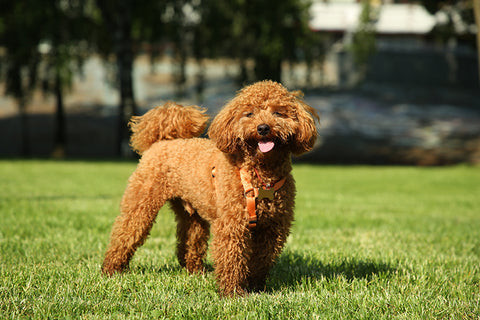 Poodle
Poodle
Poodles are intelligent, energetic, and eager to please, possessing a playful silliness that integrates seamlessly into family environments. They come in various sizes (Standard, Miniature, and Toy), offering options for different family needs and living spaces. Poodles are also considered one of the best dog breeds for allergy sufferers due to their minimal shedding.
Characteristics:
- Personality: Trainable, proud, and highly intelligent, Poodles excel in obedience and are quick learners.
- Energy Level: High energy levels, particularly for Standard and Miniature Poodles, require ample exercise and mental stimulation.
- Good with Children: Yes, Poodles are known to be good with children, especially when raised together.
- Good with Other Dogs: Socialization is important, but Poodles generally do well with other dogs, sometimes requiring supervision in initial encounters.
- Shedding: Minimal shedding makes them a great choice for families with allergies.
- Grooming: Daily brushing and regular professional clipping are necessary to maintain their distinctive coats.
- Beagle
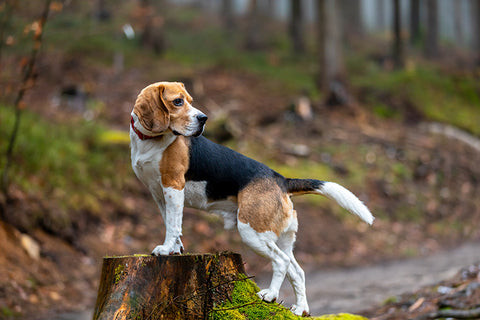 Beagle
Beagle
Beagles are irresistibly charming and make solid family companions. Their gentle and upbeat nature allows them to seamlessly transition between playful antics and comforting cuddles, adapting to the family’s mood and activities. Beagles are curious and love to explore, making them engaging pets.
Characteristics:
- Personality: Sweet, gentle, and upbeat, Beagles are known for their friendly and curious nature.
- Energy Level: Moderate energy levels mean they require daily walks and playtime to stay content.
- Good with Children: Yes, Beagles are generally good with children, enjoying their playful energy.
- Good with Other Dogs: Early socialization is crucial, but Beagles typically get along well with other dogs.
- Shedding: Moderate year-round shedding requires regular cleaning.
- Grooming: Weekly brushing is usually sufficient to manage their short coat.
- Golden Retriever
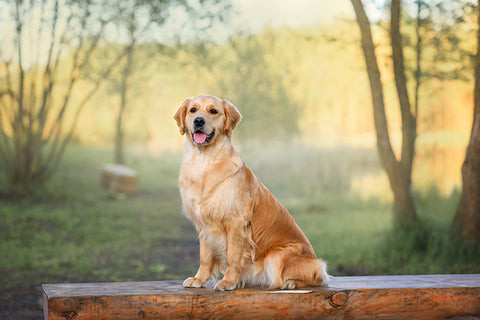 golden retriever
golden retriever
Finding a breed more fun-loving than a Golden Retriever is a challenge. Goldens are perpetually cheerful, enthusiastically participating in any games or activities children devise. Their playful and tolerant nature makes them an excellent choice for active families seeking a tireless playmate and devoted companion.
Characteristics:
- Personality: Affectionate, trusting, and devoted, Golden Retrievers are known for their unwavering loyalty and love for their families.
- Energy: Very active dogs requiring significant daily exercise to manage their energy levels.
- Good with Kids: Excellent! Golden Retrievers are renowned for their exceptional patience and gentleness with children.
- Good with Other Dogs: Yes, Golden Retrievers generally exhibit excellent compatibility with other dogs, especially with supervision during initial interactions.
- Shedding: Constant moderate to heavy shedding necessitates frequent cleaning.
- Grooming: Daily brushing is essential, along with frequent vacuuming to manage shedding.
- Bichon Frise
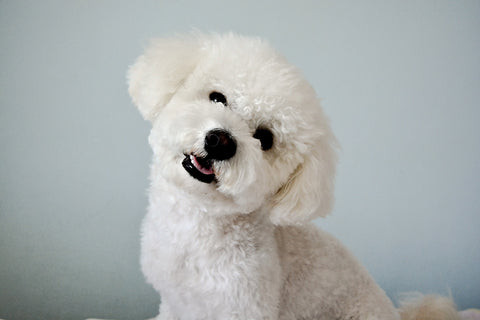 Bichon Frise
Bichon Frise
Bichon Frises are like fluffy cotton balls with legs, filling homes with cheer and delight. Their irresistible plush coats and charming personalities have made them popular family dogs. Playful and eager to learn tricks, Bichons adore children’s laughter and thrive on family interaction. They are also considered hypoallergenic, making them suitable for families with allergies.
Characteristics:
- Personality: Playful, cheerful, and perky, Bichon Frises are known for their happy-go-lucky and affectionate nature.
- Energy: Moderate energy levels make them adaptable to various lifestyles, needing daily walks and playtime.
- Good with Kids: Excellent! Bichon Frises are known for their gentle and playful interactions with children.
- Good with Other Dogs: Yes, Bichons generally get along well with other dogs, especially with supervision during initial meetings.
- Shedding: Minimal shedding and hypoallergenic coats make them ideal for allergy-sensitive families.
- Grooming: Daily brushing and regular professional haircuts are required to maintain their coat and prevent matting.
- Collie
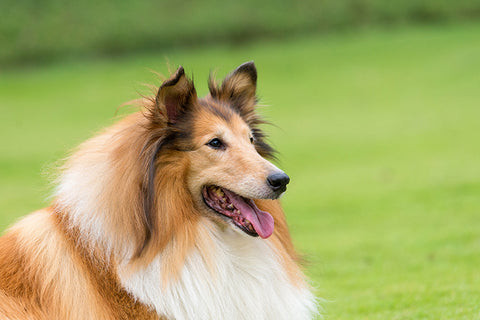 Collie
Collie
Originating from herding lines, Collies develop intense bonds with their “flock” – your family. They become gentle yet vigilant guardians, active outdoors yet composed indoors. Collies are intelligent and responsive, needing consistent mental and physical stimulation to thrive. Their loyalty and protective instincts make them devoted family dogs.
Characteristics:
- Personality: Loyal, responsive, and protective, Collies are known for their intelligence and devotion to their families.
- Energy: Very high energy levels require significant daily exercise and mental stimulation to keep them happy and well-behaved.
- Good with Kids: Yes, Collies are generally good with children, but supervision is recommended, particularly with younger children due to their herding instincts.
- Good with Other Dogs: Yes, but early socialization is important to ensure they interact well with other dogs.
- Shedding: Heavy shedding occurs twice yearly, requiring extra grooming during shedding seasons.
- Grooming: Daily brushing is needed during shedding months, with regular brushing throughout the year.
- Newfoundland
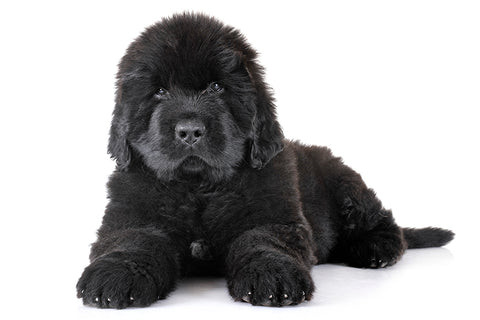 Newfoundland
Newfoundland
Newfoundlands are massive yet remarkably mild-mannered, their imposing size contrasting with their sweet and gentle temperament. They move with surprising grace indoors and patiently tolerate the playful antics of children. Known for their calm and protective nature, Newfoundlands are often called “nanny dogs” due to their gentle demeanor with kids.
Characteristics:
- Personality: Calm, generous, and obedient, Newfoundlands are known for their gentle and patient nature.
- Energy Level: Moderate energy needs, requiring daily walks but not excessive exercise.
- Good with Children: Excellent! Newfoundlands are famous for their exceptional patience and love for children.
- Good with Other Dogs: Yes, generally good with other dogs, but supervision during initial introductions is recommended.
- Shedding: Heavy year-round shedding requires consistent grooming.
- Grooming: Weekly brushing is necessary to manage their thick coat and shedding.
- Border Collie
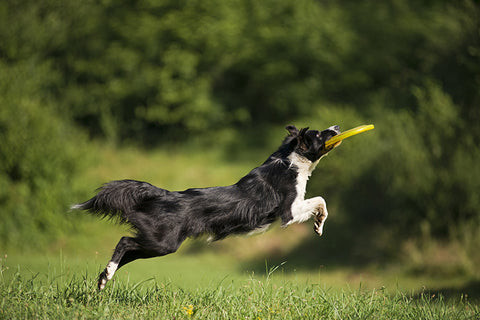 border collie
border collie
Border Collies are renowned as one of the cleverest dog breeds, needing intense daily mental and physical stimulation to thrive. Their intelligence and energy make them exceptional working dogs, and with proper training and outlets for their energy, they can be devoted family companions for active households.
Characteristics:
- Personality: Energetic, smart, and intense, Border Collies are highly intelligent and driven dogs requiring consistent mental and physical challenges.
- Energy Level: Very high energy levels demand significant daily exercise and mental stimulation to prevent boredom and behavioral issues.
- Good with Children: Excellent with supervision, Border Collies can be great with children, but their herding instincts might lead them to nip at heels, requiring training and management.
- Good with Other Dogs: Yes, with socialization from a young age, Border Collies can coexist well with other dogs.
- Shedding: Seasonal moderate shedding, with increased shedding during shedding seasons.
- Grooming: Weekly brushing is usually sufficient to maintain their coat.
- Boxer
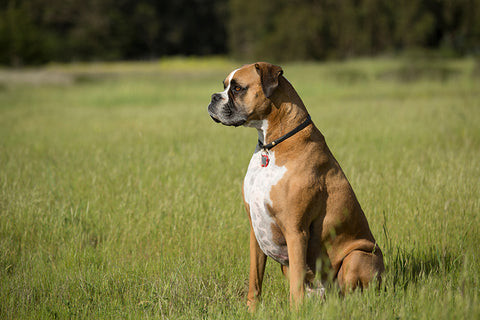 Boxer
Boxer
For families seeking a protective yet playful and fun-loving dog, Boxers are an excellent choice. Their patience, gentleness, and playful nature make them ideal for active households. Boxers are known for their loyalty and protective instincts, making them devoted family guardians.
Characteristics:
- Personality: Fun-loving, bright, and active, Boxers are known for their playful and energetic personalities.
- Energy Level: Very high energy levels necessitate substantial daily exercise and playtime.
- Good with Children: Excellent! Boxers are known for their exceptional patience and love for children.
- Good with Other Dogs: Requires socialization from a young age to ensure positive interactions with other dogs.
- Shedding: Moderate year-round shedding requires regular cleaning.
- Grooming: Weekly brushing is usually sufficient to manage their short coat.
- Shih Tzu
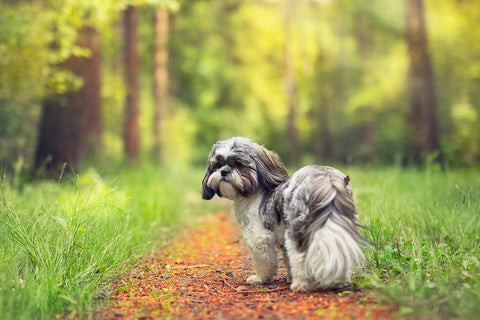 Shih Tzu
Shih Tzu
Shih Tzus are easygoing, affectionate, and trusting, making them wonderful companions. This breed is cuddly yet adaptable to varying activity levels, requiring only moderate exercise. Shih Tzus thrive on human companionship and are well-suited for families seeking a loving and adaptable small dog.
Characteristics:
- Personality: Friendly and bright, Shih Tzus are known for their affectionate and people-oriented nature.
- Energy Level: Moderate energy levels make them adaptable to different lifestyles, needing daily walks and playtime.
- Good with Children: Excellent! Shih Tzus are known for their gentle and patient interactions with children.
- Good with Other Dogs: Yes, Shih Tzus generally get along well with other dogs.
- Shedding: Moderate shedding, requiring regular grooming to manage their long coat.
- Grooming: Regular brushing is necessary to prevent matting and tangles in their long coat.
- Welsh Corgi
Originally bred to herd cattle, Welsh Corgis retain their spunky boldness and intelligence. They engage in amusing play sessions with respectful children and thrive when included in family activities. Corgis are energetic and intelligent, needing mental and physical stimulation to stay happy.
Characteristics:
- Personality: Bold, smart, and vocal, Welsh Corgis are known for their intelligent and assertive nature.
- Energy Level: Moderate energy levels require daily walks and playtime to keep them active and engaged.
- Good with Children: Good with supervision, Corgis can be good with older children who understand how to respect their herding instincts. Supervision is recommended with younger children.
- Good with Other Dogs: Requires socialization to ensure they interact well with other dogs, sometimes exhibiting herding behaviors.
- Shedding: Heavy year-round shedding requires consistent grooming.
- Grooming: Regular brushing is necessary to manage their shedding coat.
- Irish Setter
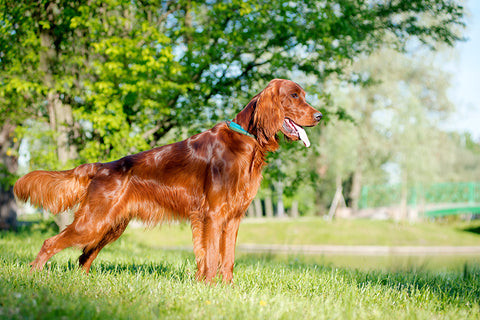 Irish Setter
Irish Setter
Irish Setters are active and fun-loving companions, always alert and enthusiastic. Their playful and outgoing nature makes them engaging family pets, thriving in active households where they can expend their energy. Irish Setters are known for their affectionate and demonstrative personalities.
Characteristics:
- Personality: Rambunctious, clownish, and demonstrative, Irish Setters are known for their enthusiastic and playful nature.
- Energy Level: High energy levels demand significant daily exercise and playtime to manage their exuberance.
- Good with Children: Good with supervision, Irish Setters are generally good with children but can be boisterous, requiring supervision, especially with younger kids.
- Good with Other Dogs: Yes, Irish Setters generally get along well with other dogs.
- Shedding: Significant year-round shedding requires regular cleaning.
- Grooming: Thrice weekly brushing is needed to manage their shedding coat.
- Vizsla
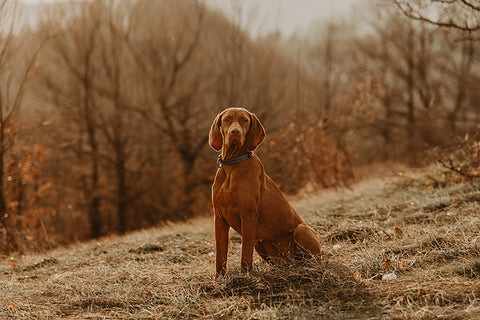 Vizsla
Vizsla
Vizslas are striking in appearance and possess a unique characteristic: they lack an undercoat, which minimizes shedding concerns. This, combined with their gentle and energetic nature, makes them ideal family pets for active children. Vizslas are known for their affectionate and Velcro-like attachment to their families.
Characteristics:
- Personality: Gentle and energetic, Vizslas are known for their affectionate and people-pleasing nature.
- Energy Level: High energy levels necessitate significant daily exercise and mental stimulation.
- Good with Children: Yes, with supervision, Vizslas are generally good with children, but their energetic nature might be overwhelming for very young kids.
- Good with Other Dogs: Yes, but under supervision, Vizslas generally get along well with other dogs, but supervised introductions are recommended.
- Shedding: Low shedding due to the lack of an undercoat.
- Grooming: Weekly brushing is usually sufficient to maintain their smooth coat.
- Samoyed
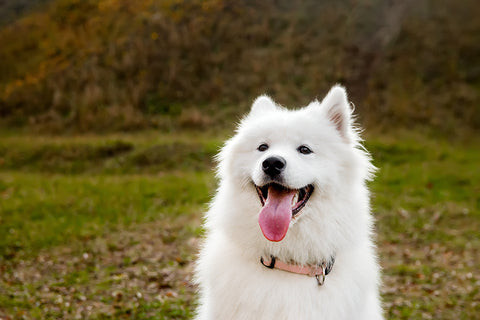 Samoyed
Samoyed
Samoyeds are known for their distinctive “Sammy smile,” reflecting their amiable temperament. They adapt readily to family routines and are remarkably loyal companions. Samoyeds are intelligent and gentle, thriving on human interaction and affection.
Characteristics:
- Personality: Friendly and gentle, Samoyeds are known for their amiable and affectionate nature.
- Energy Level: High energy levels require daily exercise and playtime to keep them happy and healthy.
- Good with Children: Yes, but may need supervision, Samoyeds are generally good with children, but supervision is recommended, especially with younger kids, due to their size and energy.
- Good with Other Dogs: Yes, Samoyeds typically get along well with other dogs.
- Shedding: High shedding due to their thick double coat, requiring regular grooming.
- Grooming: Brushing twice a week is necessary to manage their shedding coat and prevent matting.
Which is the Friendliest Dog for Families?
While most well-socialized dogs can become loving family members, certain breeds are naturally more outgoing and trusting, particularly with unfamiliar people. For families seeking an exceptionally friendly canine companion, consider these breeds:
- Labrador Retriever
It’s no surprise that Labrador Retrievers consistently rank as one of the most popular dog breeds. Their eagerness to please and love for people and other animals is unparalleled. Labs’ patience, gentle nature, and inherent friendliness make them one of the most amiable and best dog breeds for families.
- Golden Retriever
Sharing the Labrador Retriever’s friendly and tolerant temperament, Golden Retrievers are also incredibly sociable. They make friends easily and are generally always happy to meet new people and animals. Their joyful disposition and affectionate nature make them wonderful family dogs.
- Cavalier King Charles Spaniel
Few can resist the charm of a Cavalier King Charles Spaniel. Their mild-mannered and gentle nature makes them excellent companions for everyone, from toddlers to seniors. Cavaliers are known for their affectionate and adaptable personalities, fitting seamlessly into various family settings.
- Irish Setter
Beneath their elegant red coat lies an incredibly outgoing and warm heart. Irish Setters eagerly greet new people with enthusiastic “joy jumps” and affectionate nuzzles. Their friendly and demonstrative nature makes them incredibly welcoming family dogs. However, they do require sufficient exercise to channel their energy positively.
- Mixed Breed Dogs
While mixed-breed dogs have diverse backgrounds, many inherit the friendly temperaments of family-oriented breeds like Labradors or Retrievers. Adopting a mixed-breed dog from a shelter or rescue organization can be a rewarding way to find a loving and friendly family pet.
What is the Best Low Maintenance Family Dog Breed?
For families with busy lifestyles, low-maintenance dog breeds can be a perfect fit. These breeds generally require less grooming, exercise, and have eager-to-please personalities, making them well-suited for relaxed family living. Consider small to medium-sized breeds, as they are often easier to manage in terms of maintenance.
While “low maintenance” doesn’t mean “no maintenance,” these breeds generally need regular short walks and playtime to stay happy and healthy but are content with a more relaxed routine and lounging around the house.
Some of the best low-maintenance dog breeds for families include:
- Bichon Frise: Hypoallergenic and relatively low-shedding, adaptable energy levels.
- Beagle: Short coat, minimal grooming needs, moderate exercise.
- Shih Tzu: Adaptable exercise needs, friendly personality.
- Poodle (Miniature or Toy): Hypoallergenic and intelligent, smaller sizes require less space and exercise than Standard Poodles.
Essential Tips for Caring for Your Family Dog
Bringing a dog into your family is a commitment that requires responsible pet ownership. Here are essential tips to ensure your family dog thrives:
- Create a Clean and Safe Home Environment:
Dog-proof your home by identifying and securing potential hazards. Get down to nose level to scan for dangers. Secure loose wires, store cleaning supplies and medications out of reach, repair fences, and remove small objects that could be choking hazards. Supervise play interactions to ensure safety.
- Stick to a Reliable Routine:
Dogs thrive on routine. Establish a consistent schedule for feeding, walks, playtime, and even bedtime. Consistency helps with training, reinforces good behavior, and provides your dog with a sense of security. Choose a high-quality dog food and maintain a consistent feeding schedule.
- Make Veterinary Care a Priority:
Regular veterinary check-ups are essential for preventative care and early detection of health issues. Keep vaccinations up-to-date, administer flea and worm treatments as recommended by your vet, and follow dietary and exercise guidance tailored to your dog’s breed and age.
- Engage the Kids in Dog Care:
Involve children in caring for the dog appropriately. Teach them how to gently pet the dog, participate in training by giving treats as rewards, and help with tasks like filling water bowls (under supervision). Always supervise interactions between dogs and children to ensure both are safe and respectful.
- Provide Proper Diet and Exercise:
Ensure your dog receives adequate mental and physical stimulation. Follow veterinarian-recommended feeding guidelines, choose high-quality dog food appropriate for their age and breed, and avoid giving unhealthy table scraps. Provide daily exercise tailored to your dog’s energy level and breed requirements.
Conclusion
Adding a dog to your family is a significant decision that requires careful consideration of breed traits and individual temperaments to align with your lifestyle and family dynamics. However, the effort invested in finding the right furry companion pays off immensely. The bond you form with your family dog brings immeasurable joy and creates years of cherished memories for everyone involved.
Consider joining a local puppy club or online communities for further support and advice as you embark on this wonderful journey of dog ownership.
